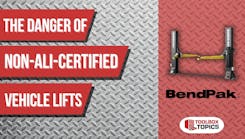It’s hot outside and your shops are undoubtedly slammed with air conditioning repairs. A/C service is always a popular topic among our readers, so we decided to compile some of the most common questions we have received with answers from our panel of experts.
Q. How do you test an A/C system?
A. Let's review a good procedure for any time you test the A/C system, starting with the legal requirements. According to Federal Section 609 requirements for motor vehicle HVAC technicians, the first requirement when performing A/C work for consideration is to be Section 609 Certified.
See the full response here: https://www.vehicleservicepros.com/service-repair/underhood/article/21201682/testing-vehicle-air-conditioning-performance
Q. What are some new technologies in A/C systems?
A. Due to the climate crisis, manufacturers have been required to be more efficient with their oil charge and they have significantly reduced the amount of oil used in the A/C system. Before, 7 oz. of oil was used, and now 4 oz. is the norm.
See the full response here: https://www.vehicleservicepros.com/service-repair/underhood/article/21224336/top-5-new-ac-technologies-technicians-need-to-know
Q. What to do if a Chevy Aveo's A/C blows hot air?
A. First, verify that the evaporator temperature sensor, engine coolant sensor, and high-pressure sensor readings are within specifications. If no problems are found, check the A/C compressor control valve in the back of the compressor for debris and make sure that the valve can move freely.
See the full response here: https://www.vehicleservicepros.com/service-repair/the-garage/blogs/blog/21152481/alldata-corp-tech-tip-what-to-do-if-a-chevy-aveos-ac-blows-hot-air
Q. How can a lack of A/C system maintenance cause poor HVAC performance?
A. Many shops neglect to think about how they may be able to prevent failures in a HVAC system by performing an annual maintenance service. You might consider whether your shop serves your clients better by repairing their vehicles to fix issues, or by maintaining them in an effort to prevent problems – or both.
Read more here: https://www.vehicleservicepros.com/home/article/20989637/air-conditioning-system-issues
Q. Are all air conditioning problems in the air conditioning system?
A. There are many situations where the air conditioner’s lack of cooling the interior may not be the air conditioner’s fault. Lets take a look at a few case studies to see what else cold be causing the issues.
Q. What do I need to know about changes in refrigerants and tooling?
A. Vehicles on the road today will primarily have R-134a refrigerant. However, OEs have begun to adopt use of a new refrigerant, R-1234yf, in response to the impact of refrigerants on the environment.
See full answer here: https://www.vehicleservicepros.com/distribution/tool-distributor/article/12056086/a-primer-on-air-conditioning-service-what-to-know-about-changes-in-refrigerant-and-tooling
Q. What different service challenges do newer vehicles present over their predecessors when it comes to A/C repair?
A. Scott Brown provides the answer to this question and much more in this episode of the Torque Factor podcast with special guest Michael Ingvardsen from Nissens Automotive.
Voice Your Opinion!
Voice Your Opinion!



